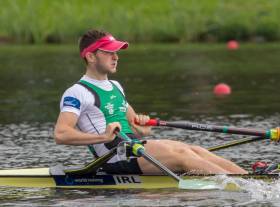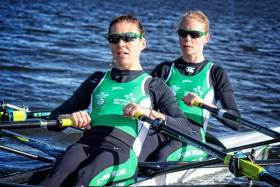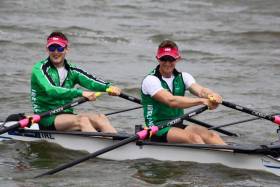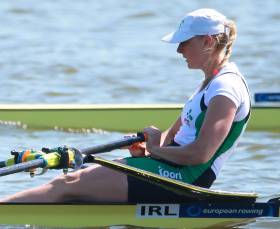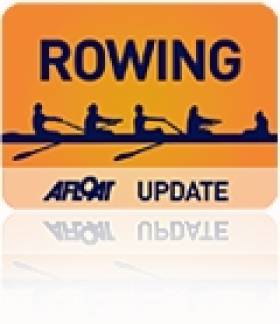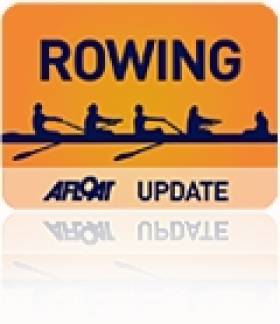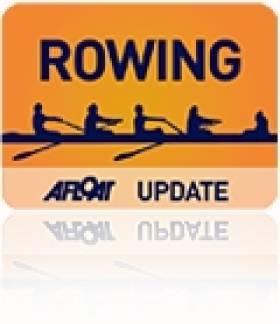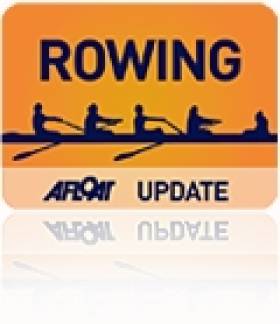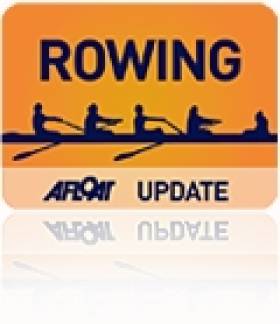Displaying items by tag: Lucerne
Paul and Gary O'Donovan Take Place in A Final in Lucerne
#Rowing: Ireland’s Paul and Gary O’Donovan took third place in their semi-final of the lightweight double sculls and secured a spot in the A Final at the World Cup Regattta in Lucerne. Britain’s Will Fletcher and Richard Chambers (a Coleraine man) had a disappointing heat but made up for it here: they started well and led until headed by Norway. Behind both, Ireland held off Poland to take the last qualification place. France were the fastest crew of the day in winning the first semi-final, with South Africa and the United States also going through.
World Cup Regatta, Lucerne, Switzerland (Irish interest, selected results)
Men
Lightweight Double Sculls – Semi-Finals (Three to A Final; rest to B Final) – Semi-Final One: 1 France (P Houin, J Azou) 6:19.16, 2 South Africa 6:21.91, 3 United States 6:22.15.
Semi-Final Two: 1 Norway (K Brun, A Strandli) 6:19.63, 2 Britain (W Fletcher, R Chambers) 6:21.37, 3 Ireland (G O’Donovan, P O’Donovan) 6:23.30; 4 Poland 6:24.08, 5 Switzerland 6:33.62, 6 Chile 6:40.20.
Women
Lightweight Double Sculls – Semi-Finals (Three to A Final; rest to B Final) – Semi-Final One: 1 New Zealand 7:01.10, 2 South Africa 7:01.16, China One 7:03.37.
Semi-Final Two: 1 Canada (L Jennerich, P Obee) 6:58.88, 2 Denmark 7:00.91, 3 2 China Two 7:01.80; 4 Ireland (C Lambe, S Lynch) 7:02.23.
Lynch and Lambe Denied A Final Place by Half a Second
#Rowing: Ireland’s Sinead Lynch and Claire Lambe just missed out on an A Final place at the World Cup Regatta in Lucerne today. The lightweight double semi-final was a good race – only Canada looked certain of a top three spot going into the final sprint and they won. Denmark finished well and took second, with China Two just taking the crucial third spot ahead of Ireland. The margin was just .43 of a second.
World Cup Regatta, Lucerne, Switzerland (Irish interest, selected results)
Women
Lightweight Double Sculls – Semi-Finals (Three to A Final; rest to B Final) – Semi-Final One: 1 New Zealand 7:01.10, 2 South Africa 7:01.16, China One 7:03.37.
Semi-Final Two: 1 Canada (L Jennerich, P Obee) 6:58.88, 2 Denmark 7:00.91, 3 2 China Two 7:01.80; 4 Ireland (C Lambe, S Lynch) 7:02.23.
O'Donovans Take Place in Lucerne Semi-Final
#Rowing: Ireland qualified directly for their second semi-final of the morning at the World Cup in Lucerne as Paul and Gary O’Donovan took second in their heat of the lightweight double sculls. South Africa, the crew with the world’s best time, led all the way and won. Ireland took over in second by half way and finished under a second behind the South Africans. They held off a push by Switzerland in the final quarter. The Swiss also qualified.
World Cup Regatta, Lucerne, Switzerland (Irish interest, selected results)
Men
Lightweight Double Sculls – Heats (Three to A/B Semi-finals; rest to Repechage) – Heat One: 1 South Africa 6:21.98, 2 Ireland (G O’Donovan, P O’Donovan) 6:22.89, 3 Switzerland One 6:31.36; 4 Japan One 6:38.28, 5 Angola 6:55.06. Heat Two: 1 France One 6:20.94, 2 Poland One 6:25.55, 3 Brazil 6:35.48. Heat Three: 1 Norway 6:21.26, 2 United States 6:23.33, 3 Britain 6:37.22.
Women
Lightweight Double Sculls – Heats (Two to A/B Semi-Finals; rest to Repechage) – Heat One: 1 South Africa 6:57.90, 2 China Two 7:01.11. Heat Two: 1 Canada 6:56.56, 2 China One 6:57.98.
Heat Three: 1 New Zealand 7:00.16, 2 Ireland (C Lambe, S Jennings) 7:01.90; 3 Germany One 7:05.79, 4 Russia One 7:06.01, 5 Chile One.
#Rowing: Sinéad Lynch and Claire Lambe qualified for the semi-finals of the World Cup in Lucerne this morning with a fine performance in their heat. Drawn against World Champions Switzerland, Germany and Russia, and with just two places available, the Ireland lightweight double scull kept their heads and moved decisively in the third quarter to take the second spot behind winners New Zealand.
World Cup Regatta, Lucerne, Switzerland (Irish interest, selected results)
Women
Lightweight Double Sculls – Heats (Two to A/B Semi-Finals; rest to Repechage) – Heat One: 1 South Africa 6:57.90, 2 China Two 7:01.11. Heat Two: 1 Canada 6:56.56, 2 China One 6:57.98.
Heat Three: 1 New Zealand 7:00.16, 2 Ireland (C Lambe, S Lynch) 7:01.90; 3 Germany One 7:05.79, 4 Russia One 7:06.01, 5 Chile One.
Puspure Wins Heat at Olympic Qualification Regatta
#Rowing: Sanita Puspure won her heat at the Olympic Qualification Regatta in Lucerne this morning and qualified directly for the semi-finals. Three places were available, but the Ireland single sculler took the lead early, and never relinquished it, though under pressure from double Olympic champion Ekaterina Karsten, who finished second. Nataliya Dovgodko of the Ukraine took third.
There is one extra place available for women’s single scullers at the qualifier as an invitation place set aside for delegations from small countries has not been taken up. Four will now qualify.
Olympic Qualification Regatta, Lucerne, Switzerland (Irish interest; selected results) – Day One:
Women
Single Sculls – Heat One (First Three to A/B Semi-Final; rest to Repechage): 1 Ireland (S Puspure) 7:38.55, 2 Belarus (E Karsten) 7:40.08, 3 Ukraine (N Dovgodko) 7:48.35; 4 Serbia 8:01.63, 5 Italy 8:03.08.
Heat Two: 1 Denmark (F Erichsen) 7:35.43, 2 Latvia (E Gulbe) 7:41.72, 3 Germany (J Richter) 7:42.23.
Heat Three: 1 New Zealand (E Twigg) 7:31.10, 2 Britain (M Hodgkins-Byrne) 7:39.01, 3 Russia (J Levina) 7:42.64.
Jennings and Lambe Win B Final at Lucerne
#Rowing: Ireland’s Sinead Jennings and Claire Lambe won the B Final of the lightweight double sculls at the World Cup Regatta in Lucerne this morning. The new crew held second to Denmark in the early stages but broke clear and by 1500 metres were on their way to an emphatic win. The crew thus places seventh overall at the event.
Sanita Puspure finished second in her B Final, eighth overall. The Denmark single sculler, Fie-Udby Erichsen started fast and while Puspure held off the rest of the competition she could not catch the woman who took silver at the Olympics in 2012.
The women’s double of Helen Hannigan and Lisa Dilleen finished fifth in their B Final, 11th overall. The crew held fourth to halfway. Britain led and would go on to win. Finland made a break in the third quarter. Ireland stayed in touch and were not far off the lead at the end.
World Cup Regatta, Lucerne – Day Three (Irish interest; selected results)
Women
Double Sculls – B Final (Places 7 to 12): 1 Britain 6:58.87, 2 Finland 7:00.80, 3 Denmark 7:01.70; 5 Ireland (L Kennedy, L Dilleen) 7:02.95.
Lightweight Double – B Final (Places 7 to 12): 1 Ireland (C Lambe, S Jennings) 7:05.11, 2 Netherlands 7:06.62, 3 Denmark 7:07.20.
Single Sculls – B Final (Places 7 to 12): 1 Denmark (F Erichsen) 7:32.23, 2 Ireland (S Puspure) 7:33.86, 3 Switzerland (J Gmelin) 7:36.19.
O'Driscoll and O'Donovan Sixth in Lucerne A Final
#Rowing: Mark O’Donovan and Shane O’Driscoll finished sixth in the A Final of the men’s lightweight pair at the World Cup in Lucerne. Britain and Italy fought it out for gold, with Italy winning. Denmark took bronze. The Ireland crew were in sixth through the four quarters.
Denise Walsh finished 4th in her B Final, 10th overall in the lightweight single sculls.
World Cup Regatta, Lucerne – Day One (Irish interest; selected results)
Men
Lightweight Pair – Repechage (First Four to A Final): 4 Ireland (M O’Donovan, S O’Driscoll) 6:50.28. A Final: 1 Italy 6:54.52, 2 Britain 6:54.71, 3 Denmark 6:56.81; 6 Ireland 7:14.15.
Lightweight Double Sculls – C Final (Places 13 to 18): 2 Ireland (G O’Donovan, P O’Donovan) 6:23.91.
Women
Pair – C Final (Places 13 to 18): 5 Ireland (H Hannigan, L Dilleen) 7:29.47.
Double Sculls – A/B Semi-Final (First Three to A Final; rest to B Final): 1 Belarus 7:14.98, 2 Germany 7:17.52, 3 Greece 7:19.13; 5 Ireland (H Hannigan, L Dilleen) 7:26.75.
Lightweight Double – A/B Semi-Final (First Three to A Final; rest to B Final): 1 South Africa 7:35.26, 2 US 7:36.79, 3 Germany 7:39.14; 5 Ireland (C Lambe, S Jennings) 7:44.11
Single Sculls – A/B Semi-Final (First Three to A Final; rest to B Final): 1 Australia (K Crow) 7:55.81, 2 United States (G Stone) 8:00.20, 3 New Zealand (F Bourke) 8:03.10; 5 Ireland (S Puspure) 8:11.50.
Lightweight Single – Repechage One (Two to A Final; rest to B Final): 3 Ireland (D Walsh) 8:11.47. B Final (Places 7 to 12): 1 South Africa (K Johnstone) 8:34.06; 4 Ireland (Walsh) 8:39.41.
Puspure Bound For B Final at Lucerne
#Rowing: Sanita Puspure finished fifth in the A/B Semi-Final of the women’s single sculls at the World Cup regatta in Lucerne today. She is now set to compete in the B Final. Kim Crow of Australia set a hot pace, with Genevra Stone and Fie-Udby Erichsen of Denmark filling second and third in the early stages. Puspure was fifth after 500 metres and did not improve that position as the race went on. Fiona Bourke of New Zealand took third behind Crow and Stone.
World Cup Regatta, Lucerne – Day One (Irish interest; selected results)
Men
Lightweight Pair – Repechage (First Four to A Final): 4 Ireland (M O’Donovan, S O’Driscoll) 6:50.28.
Women
Double Sculls – A/B Semi-Final (First Three to A Final; rest to B Final): 1 Belarus 7:14.98, 2 Germany 7:17.52, 3 Greece 7:19.13; 5 Ireland (H Hannigan, L Dilleen) 7:26.75.
Lightweight Double – A/B Semi-Final (First Three to A Final; rest to B Final): 1 South Africa 7:35.26, 2 US 7:36.79, 3 Germany 7:39.14; 5 Ireland (C Lambe, S Jennings) 7:44.11
Single Sculls – A/B Semi-Final (First Three to A Final; rest to B Final): 1 Australia (K Crow) 7:55.81, 2 United States (G Stone) 8:00.20, 3 New Zealand (F Bourke) 8:03.10; 5 Ireland (S Puspure) 8:11.50.
Lightweight Single – Repechage One (Two to A Final; rest to B Final): 3 Ireland (D Walsh) 8:11.47.
Fifth Place In Lucerne Semi-Final for Ireland Double
#Rowing: The Ireland women’s double of Lisa Dilleen and Helen Hannigan finished fifth in their semi-final at the World Cup regatta in Lucerne today. Belarus and Germany took control of the race, with Greece moving in the third quarter to secure their place in the top three and nail down a place in the A Final. Italy could not progress beyond fourth and Ireland could not improve on their fifth place.
World Cup Regatta, Lucerne – Day One (Irish interest; selected results)
Men
Lightweight Pair – Repechage (First Four to A Final): 4 Ireland (M O’Donovan, S O’Driscoll) 6:50.28.
Women
Double Sculls – A/B Semi-Final (First Three to A Final; rest to B Final): 1 Belarus 7:14.98, 2 Germany 7:17.52, 3 Greece 7:19.13; 5 Ireland (H Hannigan, L Dilleen) 7:26.75.
Lightweight Double – A/B Semi-Final (First Three to A Final; rest to B Final): 1 South Africa 7:35.26, 2 US 7:36.79, 3 Germany 7:39.14; 5 Ireland (C Lambe, S Jennings) 7:44.11
Lightweight Single – Repechage One (Two to A Final; rest to B Final): 3 Ireland (D Walsh) 8:11.47.
Jennings and Lambe Pushed Into B Final at World Cup Regatta
#Rowing: Sinead Jennings and Claire Lambe will compete in a B Final at the World Cup regatta in Lucerne. They finished fifth in their semi-final of the lightweight double sculls, won well by South Africa. Ireland were in touch at 1,000 metres, but the United States, Germany and the Netherlands moved clear of Ireland in the third quarter, fighting for the second or third placing which would send them to the A Final. The US took second and Germany third.
World Cup Regatta, Lucerne – Day One (Irish interest; selected results)
Men
Lightweight Pair – Repechage (First Four to A Final): 4 Ireland (M O’Donovan, S O’Driscoll) 6:50.28.
Women
Lightweight Double – A/B Semi-Final: 1 South Africa 7:35.26, 2 US 7:36.79, 3 Germany 7:39.14; 5 Ireland (C Lambe, S Jennings) 7:44.11
Lightweight Single – Repechage One (Two to A Final; rest to B Final): 3 Ireland (D Walsh) 8:11.47.



























